-
ABOUT US
-
ACADEMICS
Curriculum Program
Departments
- English
- High School Chinese
- Primary and Junior School Chinese.
- High School Mathematics
- Middle School Mathematics
- Primary School Mathematics
- Music and Fine Arts
- Physical Education
- Physics
- Chemistry
- History and Geography
- Physical Science and Optional courses Department
- Middle School Biology
- High School Biology
- Social Sciences
- Computer Science
- Courses in Primary School
Achievements and Matriculations
College Counseling
Science & Technology Innovation Contest
Subject Competition
-
ARTS
-
ATHLETICS
-
AT SHSID
SHSID ∣ TIMES
PTSA
Club Exhibition
- 龙吟社
- Live 2 Drama
- Choir
- Hip-pop Dance Club
- The Primary School Dance Troupe
- Symposiums Club
- Biology Workshop
- You Shan
- VEX Robotic
- Peking Opera Club
- Baseball Club
- Model United Nations
- The World Scholar’s Cup
- Future Problem Solving Club
- United States Academic Pentathlon
- OM Club
- AMC Club
- Music for Patients
- SHSID Gazette
- Smile Charity
- Cultural Moments
- SciAcademy
- Stem Doge Alliance
- Chinese Debate Club
- IAA
- Mock Trial Club
- Zhengming Club
- Furry Friends
- GT-Racing
- Village Radio
- IMMC Club
- Creative Design and Intelligent Fabrication
- Future City Research Project
- ECOCAP
- AdvocaSEA
- SPDC
- Medishine
- Floorball Club
- Animusic MTC
- Wings Up
- All Booked
Health and Wellness
Campus Safety
Cafeteria Service
-
ADMINISTRATION
-
ADMISSIONS
-
ALUMNI
Alumni Information
Honors Students
- Class of 2025
- Class of 2024
- Class of 2023
- Class of 2022
- Class of 2021
- Class of 2020
- Class of 2019
- Class of 2018
- Class of 2017
- Class of 2016
- Class of 2015
- Class of 2014
- Class of 2013
- Class of 2012
- Class of 2011
- Class of 2010
- Class of 2009
- Class of 2008
- Class of 2007
- Class of 2006
Who Studied at SHSID
SHS Foundation
-
DOCUMENTS
G1-8 | History and Geography Department: A Learning Journey with the Chinese Sages
Travel to the states,
Learn from Chinese sages,
Read the Chinese classics,
Promote common prosperity in the world.
During the Spring and Autumn of the Warring States Period, a hundred schools of thought were contending in an era of shining stars. The sages used their wisdom to restore order to Chinese society, which gave birth to many schools of thought such as Confucianism, Daoism, and Legalism. These ideas would enlighten people for more than two thousand years. On May 23rd and 24th, the sixth-grade students travelled back to the Spring and Autumn of the Warring States in history class under the guidance of Ms. Chen, embarking on a wonderful learning journey with the Chinese sages.
This learning journey consisted of seven stops. At each one, students would learn about a school of thought through a short play performance. Over 20 students from the sixth grade practiced for more than a month to present a wonderful and vivid performance, bringing all the students closer to the ancient Chinese classics.
The first stop on the journey was the Hangu Pass. There the students witnessed as Lao Zi rode through the pass, where he was persuaded by Yin Xi, the Pass Commander, to write the Daoist classic "Tao Te Ching". In this book, Lao Zi said, "The wood of a huge tree is born from the smallest of roots; a nine-story platform is built on the ground; a journey of a thousand miles begins with the first step". To reach the goal, the focus is not on the distance, but on taking the first step and continuous persistence.
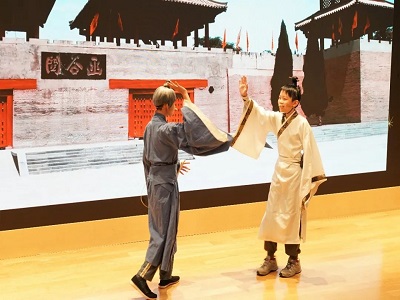
The second stop was Confucius' classroom, where an SHSIDer broke into it and disrupted Confucius’ teaching. There was a friendly competition between Confucius and the SHSIDer. Although Confucius was proficient in the six classical arts, he was not as good as the modern student when it came to a “baking competition”. Confucius said, "In a group of three, there must be one whom I can learn from." Learning should, “never feel ashamed to ask questions”. This is the way to learn more.
The next story took place in the Palace of the state of Qi. King Xuan asked Mencius for advice on how to rule the country. Through a story about sacrificing a calf and taking care of the elderly, Mencius made King Xuan of Qi realize that the ruler should "take care of the old and the young", and be benevolent and generous to the people if he wanted to bring peace to the country.
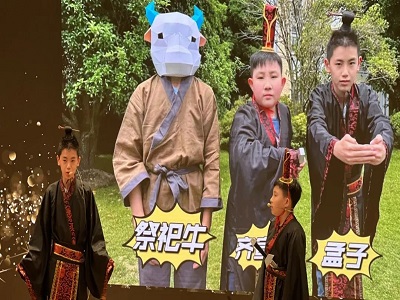
During the Warring States Period, there were many battles fought between different states. Sun Bin and Pang Juan, who once studied together and later they met on the battlefield. Sun Bin said, “those who are skilled in warfare will know the enemy's strengths and weaknesses”. He used the strategy of "Besieging Wei to Rescue Zhao" to defeat Pang Juan, and further weakened the Wei state.
The eloquent scholar of Jixia Academy named Chunyu Kun, advised King Wei of Qi with a cryptic question: "Why did a bird in the kingdom not sing for three years?” This question was asked to make King Wei change his ruling which amazed his people. Chinyu Kun also warned the king of Qi to abandon the habit of drinking at night and indulging in extravagance with the saying, "Extreme wine leads to chaos, as well as extreme happiness leads to sorrow.”
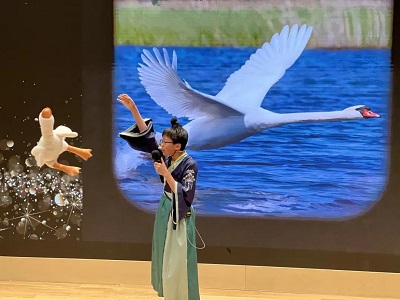
On the next stop through time, students witnessed a discussion between Zhuang Zi and Hui Zi where they talked about, "Usefulness and Uselessness", the skillfulness of the main character in the story called "The Cook Cutting up An Ox", and the idea that, "there is a limit to our life, but to knowledge there is no limit." These discussions prompted the students to think about what "usefulness" is defined as, and how to pursue the infinite learning in their limited life.
The last stop of the learning journey was at Lanling, in the state of Chu, where Han Fei and Li Si were about to leave after learning from Xun Zi for several years. Before their departure, these two students represented their goals and ambitions to the teacher. Xun Zi taught them to be "inclusive" of various schools of thought, and at the same time he said they were good students who surpassed their teacher, as the saying, "Indigo blue is extracted from the indigo plant, but is bluer than the plant it comes from".
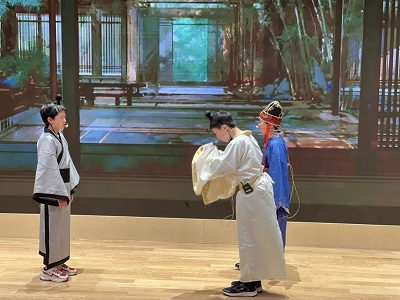
At this point, the learning journey around the states came to an end and Ms. Chen guided students to discuss and share what they had learned from today’s journey. Living in an era of continuous development and changes, we should keep learning for our whole lives. What to learn, how to learn, and who to learn from, are important questions that need to be considered. Leo from 6 (8) said Confucius’ idea that, "In a group of three, there must be one whom I can learn from" indicated that learners should have enthusiasm and not miss any opportunity to learn from people around them. Elaine was deeply impressed by Xun Zi's "inclusiveness" and felt that learners should be broad-minded and unrestricted in their learning so they can explore a broader cognitive field and achieve the goal of "surpassing the teachers". Sophie from 6 (9) said that learners should not be bound by the known mind and as Zhuang Zi said, they should dare to break through and innovate constantly. The final conclusion of the discussion was that a "LEARNER" should be limitless, enthusiastic, ambitious, reliable, noble, eloquent, and radical.
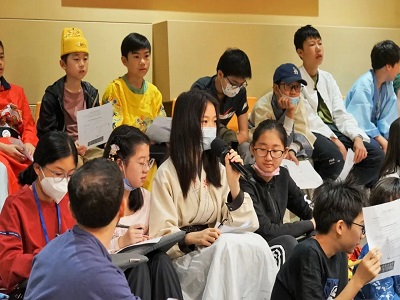
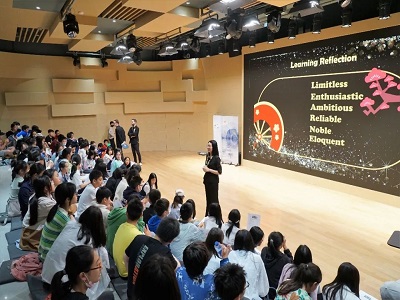
The Chinese Classics contain Eastern philosophies and wisdom. All the sixth-grade history teachers also shared their favorite Chinese classic phrases in class, such as Lao Zi’s "The highest goodness is like water, and the Dao follows nature"; Sun Bin's "perseverance and strategic planning"; Mencius' "Respect the elderly, love the young, and conduct virtue throughout the world"; Han Feizi's "Clear Rewards and Punishments, Teaching by Law". They encouraged the students to be independent learners with a sense of global citizenship. Through reading the Chinese classics and learning the wisdom of the Chinese sages, students can understand and promote Chinese culture, promote common prosperity, and help better the world.
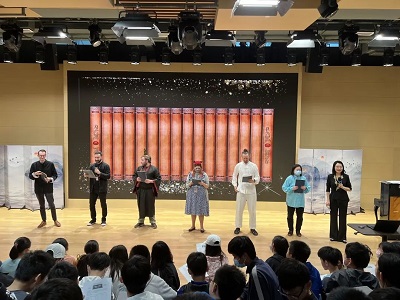
Written by Liu Chen
Pictures by Xu Jing, G6 Teachers
Supervised by Ben Seevers
Edited by Serene Yang, Cynthia Xie (Intern), Niall Keenan